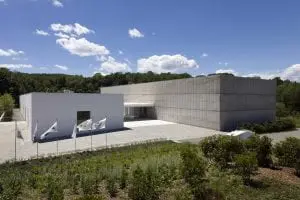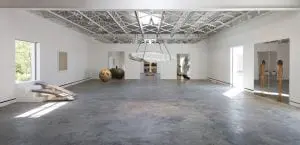Philipstown board questions art space zoning
By Liz Schevtchuk Armstrong
The Philipstown Town Board last week questioned whether Magazzino Italian Art on Route 9, approved as a warehouse, should be re-zoned as a museum.
During the board’s monthly meeting on March 1, Supervisor Richard Shea praised Magazzino, owned by Nancy Olnick and Giorgio Spanu of Garrison, as a benefit to the town but suggested that its true identity be acknowledged.
“I know it was constructed as an art-storage facility, but everybody knows it’s a museum,” he said, suggesting the zoning should be changed “so it can be a museum, because it’s silly to just go on like this.”

He added: “I can’t imagine a better outcome for that [former industrial] property. In my wildest dreams, I couldn’t have imagined a museum coming into town with great artwork and the architecture is incredible, they hired all local contractors. And they throw a hell of a party.”
Kim Conner, a Planning Board member, agreed that Magazzino “is a great thing for the town.” However, she told the Town Board, “it would’ve been nice if they’d been upfront from the beginning,” when the Planning Board reviewed site plans.
“I asked them repeatedly” exactly what the building would be, she recalled. “I just caution applicants to tell us the truth.”
The minutes of a November 2016 Planning Board meeting noted “board members felt the applicants were still being vague regarding the use of the building.” They questioned how many people would be visiting it (a maximum of 155, although realistically, no more than 50 per day, they were told) and whether there would be sufficient fire safety features and access for emergency vehicles.

Documents filed with the Planning Board before a January 2017 public hearing stated that Magazzino, which is Italian for warehouse, would be a building “in which extensive collections of art will be stored” and would be “used for educational and research purposes.” It would be “absolutely not open to the public but rather made accessible by appointment only in order to limit the number of visitors,” the documents said.
Magazzino opened in June. Visitors can make appointments online for visits between 11 a.m. and 5 p.m. on Thursday to Monday. Because of the limited parking, it often runs shuttle buses to Main Street in Cold Spring.
Why Shea raised the issue is not clear, but his Town Board colleagues agreed that Magazzino’s zoning should be reconsidered. It is not clear what practical effect a change would have on the building, beyond allowing Magazzino to admit visitors without reservations.
Amid a snowstorm, Shea did not immediately respond to emails seeking more details. In a statement, Olnick and Spanu said, “We appreciate the support of the local community for Magazzino and welcome the initiative by the Town Board to amend the zoning.”


Wow Highlands Current. Really? How far slipped, how lowered the bar.
I actually like this article because every time I drive by that place I call B.S. How is the community benefiting from a space where you have to make an appointment to visit? It’s right down the block from me and I haven’t gone. It isn’t marketing itself as a place one can easily visit. The one article that I think The Current could have done a better job on was the one about the KKK’s presence in the area. So many questions unanswered from that reporting.
You have to make an appointment just to get your hair cut, oil changed, etc., and it doesn’t elicit any letters to the editor. And I don’t see how the story about zoning got the KKK involved…
Maggazino brings tourists to town, at the very least, and if what it offers doesn’t interest you, that’s alright, but it’s a better use of the site than what was empty for many years. They also employ local tradespeople and other staff. Cyberchron wasn’t really doing that anymore.
Travis you will have to elaborate on your dissatisfaction here.
Are you referring to the piece we did about the KKK in the area in the 1930s?
I am. The news articles from that period were interesting but the piece could have used more investigation and elaboration. For example, what were the demographics of the area?
Why would that matter?
I will elaborate by saying that if you compare the level of journalism evidenced in this article to the general fare of the Current/Paper just 18 months ago the disparity is striking. Your own article answers the only substantive question it barely poses at its end, in the first paragraph. The fact that you then childishly restate at the end when questioning, apparently the motive, or “practicality” of the boards movement to properly rename this space. The very fact that you can’t clearly see this for yourself further proves my point and simultaneously makes me sad that you have denigrated the paper as an local institution overall. If you think you are muckraking, I assure you, you are not. What you have done here is more along the lines of hovering right above s**t stirring.
Um, OK.
Again, just, wow. A paper that says “um” and right when I was not sure you could slip any further.
The overall tone of the article tries to drum up a controversy that is not there. If the article had actually done some research it may have concluded that what the town board is proposing to do would address the very issues you raise. Sadly it sacrifices its basic journalistic enterprise for something far more base.
What the article failed to provide was an explanation of the social, racial, and economic make up of the region at the time that allowed or inspired the existence of the Klan. Yes, it provided a bit of backstory about the general atmosphere of the nation and the values the Klan expounded but how did that resonate in the Highlands region? As a reader this backstory is extremely important. A couple of other important questions are how pervasive is the legacy of the Klan in the area and what is the current climate of race relations in the area. There is so much potential for a greater in-depth article.
As for Magazzino, a couple of ways it can be a better member or the community is to have community days where it opens its doors free of charge to residents of Philipstown as well as be a destination for Haldane field trips. Maybe it’s doing these things already and I am unaware.
The odd comments to this article are becoming more of a story than the article itself. One thinks therefore there may be more to this story than we know.
Whenever one publicly puts one’s words to print there is a chance for exposure and criticism. Consequences? Even publishers and reporters know this.
If this article slips in any way I would ask why there was not more probing into whether or not and to what extent the town zoning code is to be followed, by whom, and who is responsible, or not, to make it so. Also, what are the advantages and disadvantages, of the development of warehouses, or of museums in the town. Could tax revenues be affected?
How did this issue develop? Was a lawsuit threatened? Is it not a bit unusual for a “warehouse” to run half-page ads in the two local newspaper continuously? (Legal, and at the discretion of the newspapers, obviously.)
This being the United States of America I for one have no problem with the freedom of the press to publish moderate, substandard, not newsworthy, and/or unsatisfying articles, particularly once it appears under attack along some of the most obscure if perhaps personal lines. Until now I was generally OK with museums as well. Now, not so sure.
I may be forced to be so cliched as to state “I stand with the Highlands Current.” I don’t think this paper saw any particular controversy in the story.